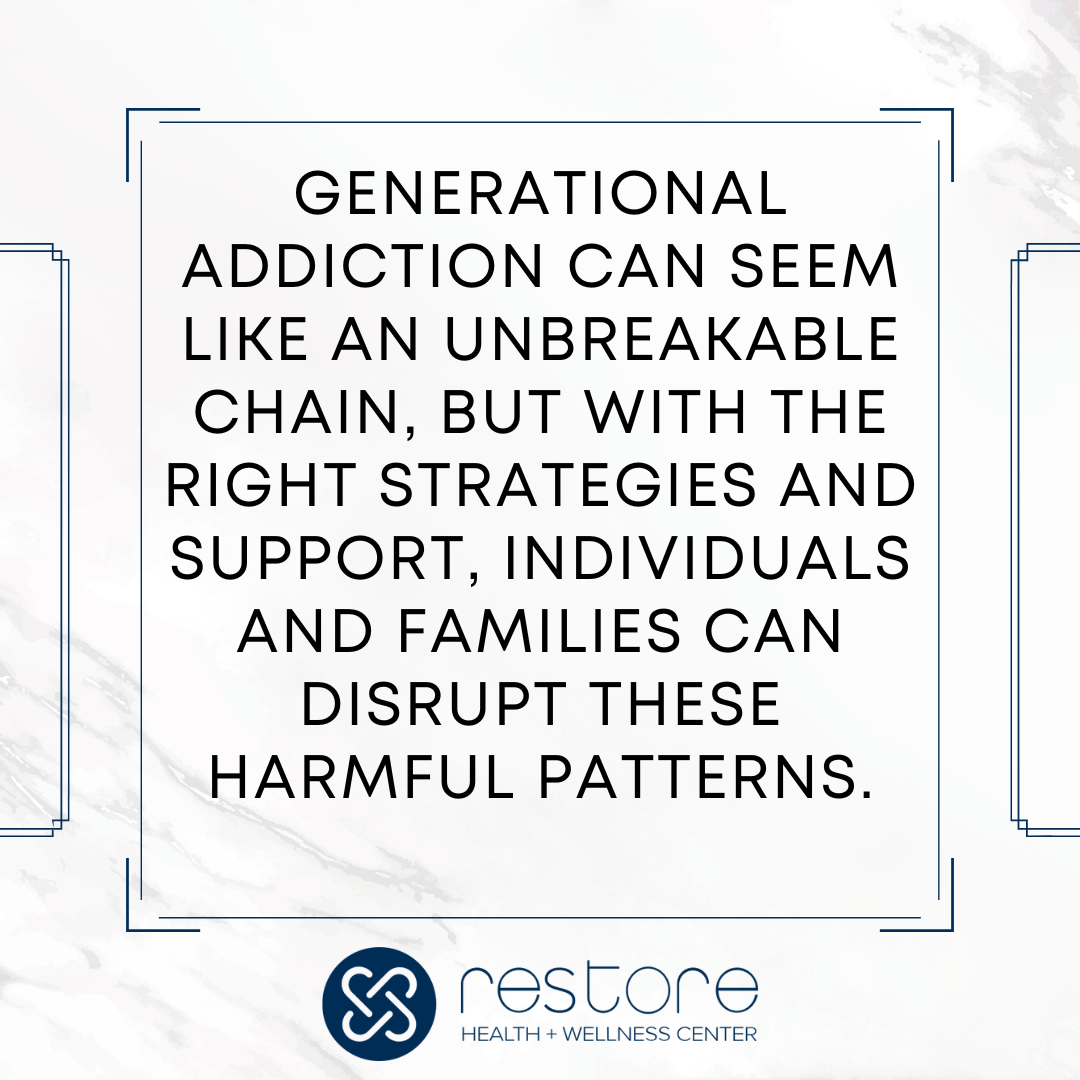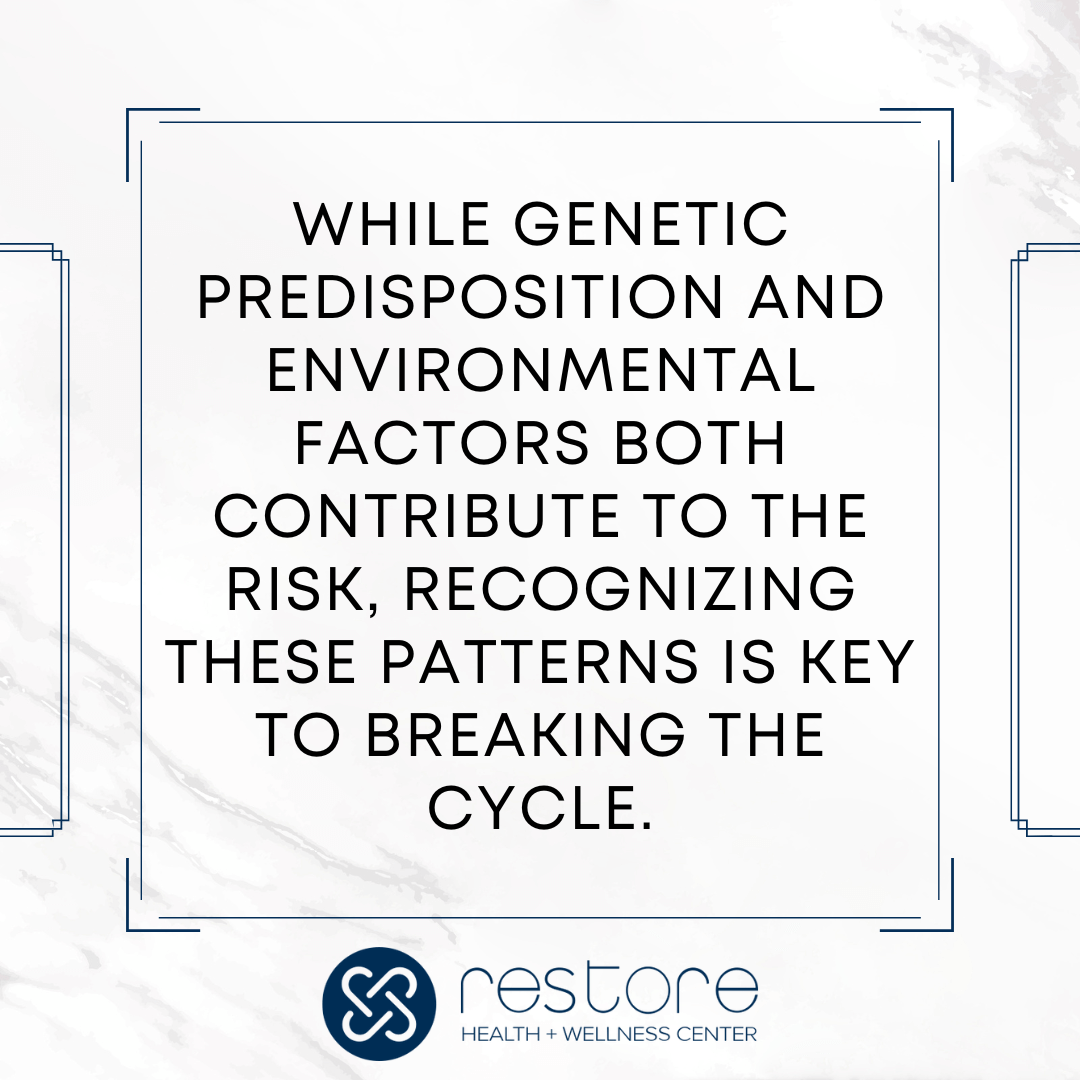
Addiction may run in families, but it doesn’t have to define your future because breaking the cycle is possible. Generational addiction can seem like an unbreakable chain, but with the right strategies and support, individuals and families can disrupt these harmful patterns. Wanting to be free from this pattern is highly possible, especially if you want to secure yourself and the future generations after you.
Understanding how generational addiction develops and how to combat it is necessary for breaking free from its grip. Choosing to do this leads to a healthier, more hopeful legacy that you can establish starting today. Let’s explore the roots of generational addiction and the steps you can take to break the cycle.

What is Generational Addiction?
Generational addiction refers to the transmission of substance use patterns and addictive behaviors from one generation to the next within a family. It’s not just about a person’s struggle with addiction; it involves a complex interplay of genetic, environmental, and behavioral factors that influence multiple generations.
The Role of Genetics
Genetics plays a significant role in the likelihood of developing an addiction. Research shows that getting hooked on substance and alcohol abuse can be partly hereditary. This means that individuals with a family history of addiction are at a higher risk of developing addictive behaviors.
This predisposition doesn’t mean that addiction is inevitable, but it can make family members more vulnerable to developing cycles of addiction.
Environmental Influences
While genetics contribute to the risk of addiction, environmental factors are equally influential. In families where substance use is common, children are more likely to be exposed to drugs or alcohol at an early age, normalizing the behavior. Additionally, unhealthy coping mechanisms—pills to manage stress, trauma, or emotions—are often modeled and learned within the family environment.
This exposure, combined with a lack of positive alternatives for dealing with life’s challenges, reinforces dependencies.

The Impact of Generational Addiction in Families
Drug abuse that spans generations can have profound and lasting effects on family dynamics, particularly on the emotional and psychological well-being of its members. Generative patterns of drug use and coping techniques have a profound impact on behavior. It can contribute to the perpetuation of emotional trauma and mental health difficulties in certain circumstances.
Emotional and Psychological Effects
Growing up in a family affected by addiction often results in significant emotional and psychological challenges. Children and other family members may experience trauma due to the instability, neglect, or abuse. This can lead to chronic anxiety, depression, and low self-esteem.
Behavioral Patterns
Kids who see their parents or grandparents struggling with addiction are more likely to use unhealthy ways to deal with stress, escape reality, or dull mental pain. These actions are picked up by watching others and doing them yourself, as using drugs becomes a “normal” way to deal with problems in life. If these kids don’t have good role models or better options, they might keep doing the same things as adults, which could lead to addiction.
Breaking the Norm
Recognizing these generational patterns is the first step toward breaking drug and alcohol addiction in California. It requires a conscious effort to understand how addiction has shaped the family dynamic and to take deliberate action toward change. Breaking the norm involves the following:
- seeking help through therapy,
- joining support groups,
- getting rehabilitation programs, and
- learning healthier ways to cope with stress and trauma.

Strategies for Breaking the Cycle
Families do not have to remain bound by the chains of addiction. With awareness, intervention, and support, it’s possible to build a healthier, more stable family environment and prevent the next generation from inheriting the same struggles. Here are some of the best strategies to help break free from an occurring pattern of addiction.
- Awareness and Education: Encourage educating yourself and your family about the risks of addiction and the importance of healthy coping strategies.
- Seeking Professional Help: Highlight the importance of therapy, counseling, and support groups like the Los Angeles rehab in addressing both addiction and the underlying issues that contribute to it.
- Healthy Communication: Discuss the need for open and honest communication within families to address the impact of addiction and foster healing.
- Creating a Sober Environment: Offer tips on creating a home environment that supports sobriety, such as removing triggers and promoting healthy activities.
- Strengthening Family Bonds: Encourage activities that strengthen family connections, like spending quality time together, engaging in hobbies, and supporting one another’s goals.
- Setting Boundaries: Discuss the importance of setting and maintaining healthy boundaries to protect your recovery and encourage positive behaviors within the family.
- Teaching Life Skills: Encourage teaching children and teens essential life skills, such as emotional regulation, problem-solving, and stress management, to reduce the risk of future addiction.
- Encouraging Open Dialogue: Foster an environment where the next generation feels comfortable discussing their feelings, challenges, and concerns without fear of judgment.

Conclusion
Generational addiction deeply affects families by creating cycles of emotional trauma, unhealthy coping mechanisms, and substance use patterns passed down through generations. While genetic predisposition and environmental factors both contribute to the risk, recognizing these patterns is key to breaking the cycle.
Also, by seeking support, embracing healthier coping strategies, and making a conscious decision to change, families can disrupt the legacy of addiction and create a foundation of emotional well-being for future generations.
Take hold of your family’s future. Contact Restore Health and Wellness Center to break free from the cycle of addiction and create a safe environment for them for generations to come. Our compassionate team is ready to support you every step of the way.












